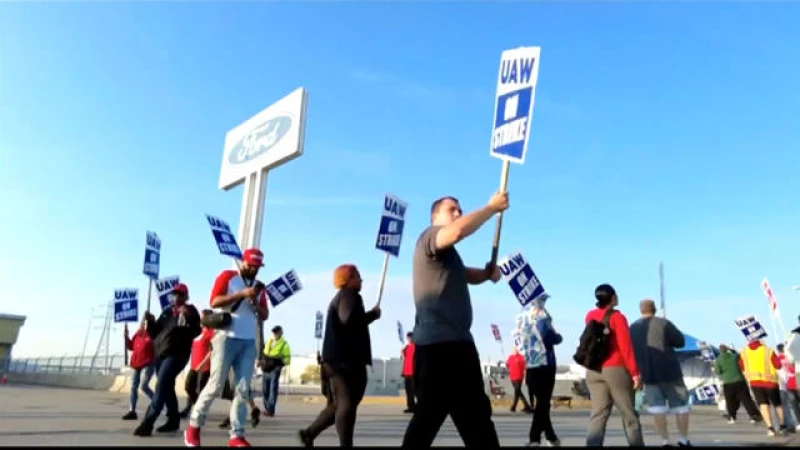The United Auto Workers union overwhelmingly ratified new contracts with Ford and Stellantis, along with a similar deal with General Motors will raise pay across the industry, force automakers to absorb higher costs and help reshape the auto business as it shifts away from gasoline-fueled vehicles.
Workers at Stellantis, the maker of Jeep, Dodge and Ram vehicles, voted 68.8% in favor of the deal. Their approval brought to a close a contentious labor dispute that included name-calling and a series of punishing strikes that imposed high costs on the companies and led to significant gains in pay and benefits for UAW workers.
The deal at Stellantis passed by a roughly 10,000 vote margin, with ballot counts ending Saturday afternoon.
Workers at Ford voted 69.3% in favor of the pact, which passed with nearly a 15,000-vote margin in balloting that ended early Saturday. Earlier this week, GM workers narrowly approved a similar contract.
The automakers and the United Auto Workers (UAW) have reached new contract agreements that will run through April 2028, effectively ending the contentious talks that began last summer. These negotiations had led to six-week-long strikes at all three automakers. The UAW leader, Shawn Fain, had strongly criticized the companies, calling them enemies of the UAW and declaring an end to union cooperation with them.
Following unsuccessful negotiations during the summer, Fain initiated strikes on September 15 at one assembly plant per company. The strikes were later extended to parts warehouses and other factories in order to increase pressure on the automakers. Tentative agreements were finally reached in late October.
The new contract agreements have been widely regarded as a victory for the UAW. The automakers have agreed to significantly increase pay for top-scale assembly plant workers, resulting in 33% wage gains through raises and cost-of-living adjustments. Top assembly plant workers will receive immediate 11% raises and will earn approximately $42 per hour when the contracts expire in April 2028.
Additionally, the automakers have agreed to eliminate many of the multiple tiers of wages previously used to pay different workers. They have also expressed a willingness to include new electric-vehicle battery plants in the national union contract. This provision will allow the UAW to unionize the EV battery plants, which are expected to represent a growing portion of industry jobs in the coming years.
UAW Contracts Ratified, Leading to Wage Increases for Non-Union Automakers
"I think this is a huge win for the UAW that they got all three contracts ratified," said Art Wheaton, director of labor studies at Cornell University. "It's lifting the boats of all or many autoworkers."
Following the ratification of the UAW contracts, three non-union, foreign automakers - Honda, Toyota, and Hyundai - have swiftly responded by raising wages for their factory workers. This decision came after the UAW announced its plans to aggressively unionize their plants and also recruit workers at Tesla, according to Fain.
In the past, foreign automakers have argued that their workers earn similar wages to UAW members, making a union unnecessary. They have also accused the UAW of causing the bankruptcy of GM and the former Chrysler in 2009, as well as engaging in corruption through a bribery and embezzlement scandal starting in 2017.
However, with Fain's election and the new contracts, the UAW has effectively addressed and resolved these concerns, said Wheaton.
While wages at nonunion factories may be nearly equal, UAW workers enjoy better healthcare and retirement benefits, which are likely to be appealing to workers at nonunion plants as they age.
Additionally, Wheaton believes that the contracts with the auto companies will lead to higher wages in auto-parts supply companies and other industries.
"The union's got way more power" because of the deals, said a worker at Ford's assembly plant in Wayne, Michigan, where employees went on strike for the entire six weeks. "Look at everybody now. People want to unionize."
The worker, a Ford veteran who helps assemble Ford Bronco SUVs and Ranger pickup trucks, said he is pleased he'll be earning $42 an hour by the contract's end. He also is happy negotiators were able to persuade Ford to pay workers about $100 a day for the time they were on strike.
But under the settlement, new hires and temporary workers will receive much larger raises than longtime assembly plant workers, with some more than doubling their pay. That issue nearly sank the contract at GM. It is worth noting that raising wages for the lowest-paid workers has been a focus of the union movement in the U.S. for the past year.
Analysis: Challenges Ahead for Auto Companies as U.S. Market Slows
A slowing U.S. auto market and already inflated prices that have made new vehicles unaffordable for many people will make it hard for companies to charge more, according to industry analyst Michelle Krebs.
Krebs, an analyst at Cox Automotive, predicts flat U.S. auto sales next year. Slowing demand coupled with rising factory output is expected to result in more discounts for consumers. Additionally, the average auto loan interest rate of 10% will further hinder auto sales by increasing monthly payments.
The recent success of the union in securing significant wage gains is seen as a political win for President Joe Biden. Biden, who recently visited workers on a Detroit-area picket line and traveled to Belvidere, Illinois, has positioned himself as a champion of the working class. The strikes, while not detrimental to the economy, have resulted in higher wages for middle-class workers, whose votes Biden needs as he seeks a second term.







